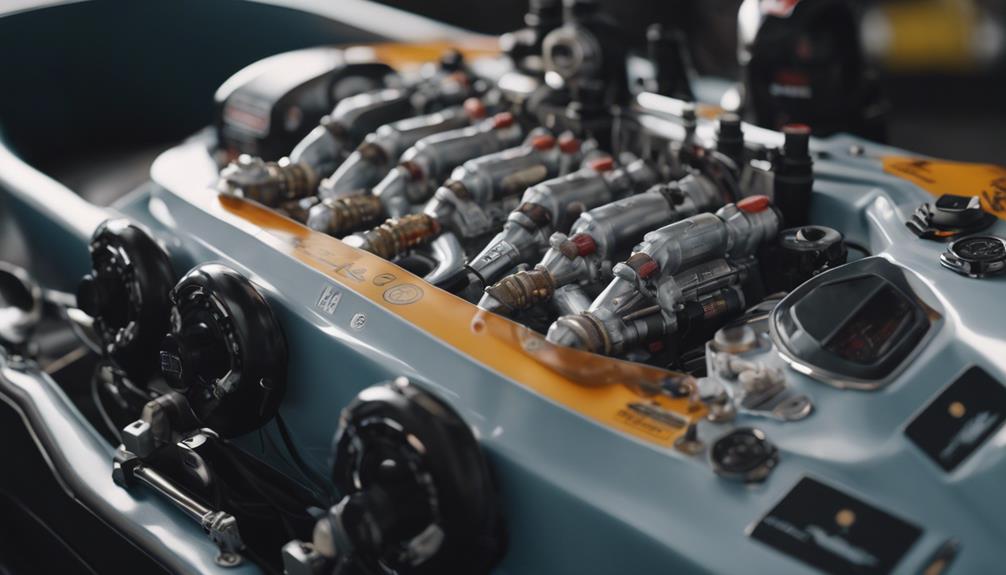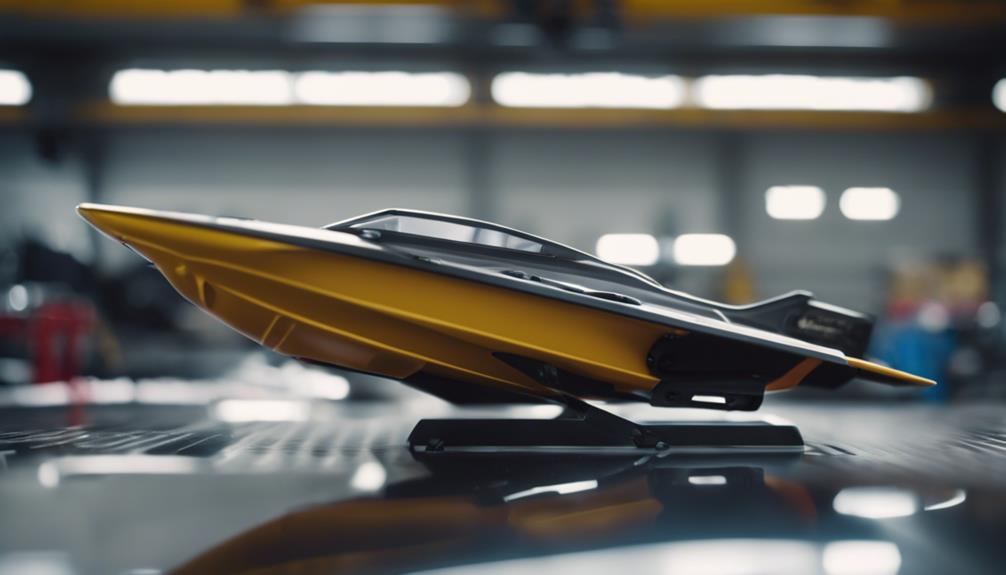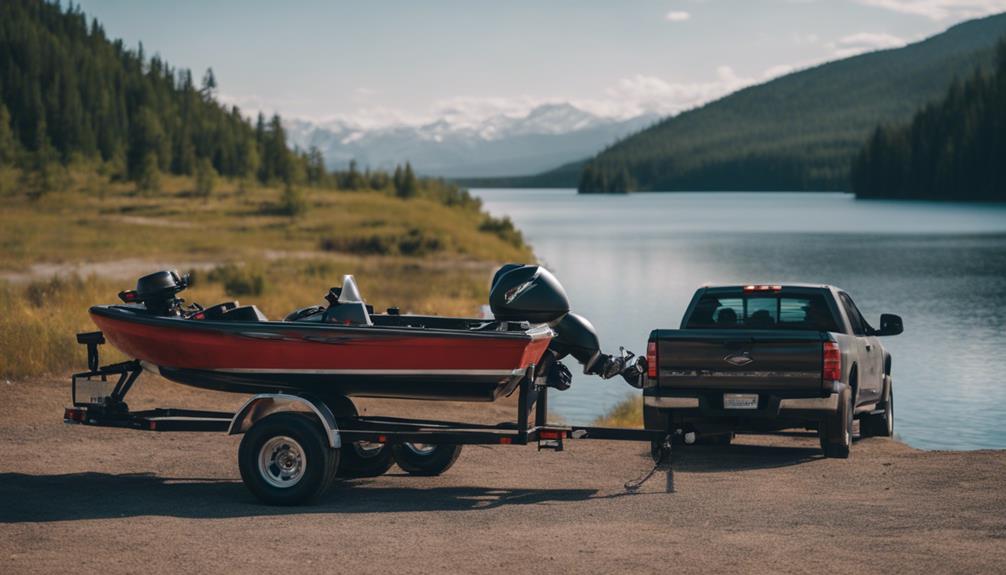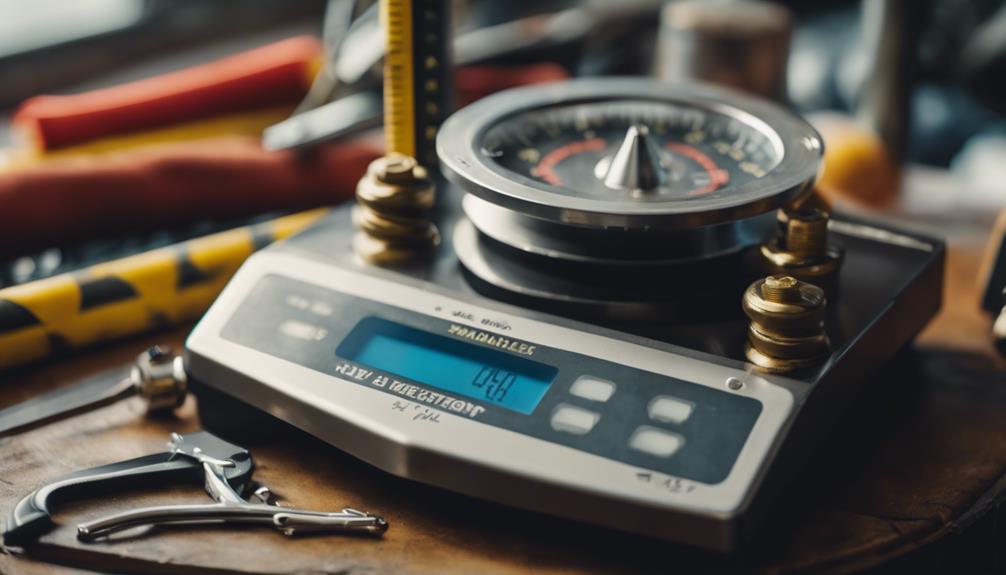Small jet boats usually weigh between 1,200 and 3,000 pounds, but it varies by size and model. For example, a 16-foot CobraJet can weigh around 1,600 pounds, making it lightweight and easy to tow. In contrast, an 18-foot model might tip the scales at about 3,000 pounds. The weight also changes depending on the materials used and engine type. Aluminum boats are generally lighter than those made from fiberglass. Knowing these factors is essential for safe towing. Stick around to uncover more about the specific models and their unique weight characteristics!
Key Takeaways
- Small jet boats typically weigh between 1,200 to 3,000 pounds, varying by model and size.
- An 18-foot model averages around 3,000 pounds, while a 16-foot CobraJet can weigh as little as 1,600 pounds.
- Engine type significantly affects weight, with big block engines adding more pounds than smaller or aluminum engines.
- Hull material influences weight, with fiberglass models ranging from 1,700 to 2,900 pounds and aluminum models being lighter.
Average Weight of Small Jet Boats
When considering the average weight of small jet boats, you'll find that an 18-foot model typically weighs around 3,000 pounds, including all essential components. This weight includes the hull, engine, hardware, and even the trailer.
If you're looking at smaller options, like a 16-foot CobraJet, you might discover that it weighs as little as 1,600 pounds, highlighting how size and design can greatly impact the overall weight of the boat.
For aluminum fishing boats, the weight can also vary, often influenced by the construction materials and specific features. While some estimates suggest lighter averages around 2,000 pounds, keep in mind that weight can fluctuate based on additional gear. A classic example is the 1976 Hawaiian model, which weighs approximately 2,990 pounds without fuel.
As you explore various models, remember that the weight of the boat plays a crucial role in performance, fuel efficiency, and ease of transport. Understanding these averages helps you make informed decisions about which jet boat best meets your needs and preferences.
Components Affecting Weight

When you're considering the weight of a small jet boat, the engine type and hull material are key factors.
Larger engines can greatly boost the overall weight, while the choice between fiberglass and lighter materials like carbon fiber or aluminum can make a big difference too.
Understanding these components helps you gauge how much your boat will really weigh.
Engine Type Impact
The type of engine you choose for your jet boat often plays an important role in determining its overall weight. If you opt for a big block engine, you can expect a significant increase in total weight compared to smaller engines. Larger horsepower motors can add hundreds of pounds, making it vital to evaluate how this impacts your boat's performance and handling.
Another factor to reflect on is the material of the engine. Engines made from aluminum are typically lighter than those constructed from cast iron, which can help reduce the overall weight of your jet boat. However, if you decide to add components like superchargers or turbochargers, these can further increase the weight, affecting weight distribution and balance.
When calculating the total weight for towing purposes, don't forget to factor in the engine along with fuel capacity and any additional equipment. By making informed choices about the engine type and its materials, you can optimize your jet boat's weight and performance, ensuring a smoother ride and better fuel efficiency on the water.
Hull Material Choices
Choosing the right hull material for your jet boat directly influences its overall weight and performance on the water. The hull construction material you select can greatly impact how your boat handles and its towing requirements.
Generally, fiberglass boats weigh between 1,700 to 2,900 pounds, while aluminum boats are much lighter, typically ranging from 300 to 900 pounds. If you're looking for a lightweight option that offers durability, aluminum could be your best bet.
However, if you prefer a smoother finish, fiberglass might appeal to you, despite its heavier weight. Advanced materials like carbon fiber can also reduce your jet boat's weight by as much as 50%, making it an attractive choice for performance enthusiasts.
Keep in mind that the weight of your trailer also contributes to the total towing weight, and dual axle trailers usually add more bulk than single axle options. Additionally, consider your engine type—bigger engines can increase weight, so balance your choices wisely.
Ultimately, the hull material you choose will affect not just the weight but the overall efficiency and enjoyment of your boating experience.
Examples of Popular Jet Boats

When you're considering different jet boats, it's crucial to look at popular models and their weights.
For instance, the Hawaiian model and Spectra 20 provide great examples of how engine choice impacts weight.
Common Jet Boat Models
Many popular jet boat models vary considerably in weight, showcasing their unique designs and capabilities. When you're considering which jet boat suits your needs, it's crucial to understand how their weights can impact performance and handling. Below is a quick overview of some common models and their weights:
| Model | Weight (lbs) |
|---|---|
| 1976 Hawaiian | 2,990 |
| Spectra 20 | 3,220 |
| 16ft CobraJet | 1,600 |
| 18ft Avenger | 3,000 |
| 2001 Sugar Sand TANGO | Varies |
For instance, the lightweight 16ft CobraJet, weighing just 1,600 lbs, makes for a nimble option that's easy to tow and maneuver. On the other hand, heavier models like the Spectra 20 can weigh around 3,220 lbs, reflecting their robust design suited for more adventurous outings. It's noteworthy that a fishing boat can weigh considerably less or more, depending on its type and purpose. Understanding these differences can help you make an informed choice for your jet boating adventures.
Weight Comparisons Across Types
How do the weights of various popular jet boats compare to one another, and what does that mean for your boating experience? When you're looking at options, you'll find that the weight can vary considerably.
For instance, the 18ft Avenger, featuring a big block Ford engine, tips the scales at about 3,000 lbs. In contrast, the 16ft CobraJet is a lighter option, weighing in at only 1,600 lbs, which might be ideal if you prefer agility and easier towing.
The 1976 Hawaiian model, with a big block Chevy engine, weighs around 2,990 lbs, while the Spectra 20, with additional features, comes in heavier at 3,220 lbs. These examples highlight how engine types and added features can influence a boat's overall weight.
Moreover, hull materials play an essential role; aluminum constructions can make a boat lighter and enhance performance.
If you're considering a small jet boat, understanding these weight differences will help you choose the right model for your needs, ensuring you enjoy a smooth and enjoyable boating experience.
Factors Influencing Jet Boat Weight
Understanding the various factors that influence jet boat weight, like size, materials, and engine type, is vital for selecting the right model for your needs. Different boats fall into varying weight ranges, impacting your towing options and performance on the water.
Here's a quick look at some popular jet boats and their weights:
| Model | Length (ft) | Weight (lbs) |
|---|---|---|
| CobraJet | 16 | 1,600 |
| Avenger | 18 | 3,000 |
| 1976 Hawaiian | 18 | 2,990 |
| Fiberglass Fishing | 16 | 2,200 |
| Aluminum Jet | 17 | 1,800 |
As you can see, materials play a vital role; fiberglass boats tend to weigh more than those made from aluminum or lighter materials. Additionally, the engine type and extra equipment like coolers can greatly increase the overall weight. Don't forget to take into account the weight of the trailer too, as dual axle trailers can add considerable weight compared to single axle options. All these factors make it vital to weigh your choices carefully.
Weight Reduction Techniques

To achieve a lighter jet boat, consider incorporating advanced materials and making thoughtful design choices that maximize performance without adding unnecessary weight. Utilizing materials like honeycomb and carbon fiber can drastically reduce your jet boat's weight, potentially cutting it in half compared to traditional options.
You might also explore engine modifications; opting for a smaller, lighter motor not only saves weight but can also enhance efficiency. Every bit counts when you aim for a lightweight jet boat.
In addition, scrutinize your design. Stripping away unnecessary hardware and features can greatly lessen the overall weight while maintaining performance. Regular maintenance is essential, too; keeping your gear in check prevents excess weight from accumulating and guarantees peak handling on the water.
Don't forget about the trailer you choose. A lighter aluminum trailer can decrease the total towing weight, making your journeys smoother and more fuel-efficient.
Towing Considerations for Jet Boats

When towing a jet boat, it's essential to evaluate the total weight, including the boat, trailer, fuel, gear, and passengers, to guarantee your vehicle can handle the load safely. Your vehicle's towing capacity must meet or exceed this combined weight. Here's a quick breakdown to help with your weight calculations:
| Component | Typical Weight Range | Notes |
|---|---|---|
| Jet Boat | 1,200 – 3,000 lbs | Varies by model and size |
| Trailer | 1,000 – 1,600 lbs | Included in total weight |
| Fuel & Gear | 340 – 950 lbs | Depends on tank size & equipment |
Make sure to include all these factors in your calculations. For instance, a fully loaded jet boat with a trailer and gear could easily surpass your vehicle's towing capacity. As a result, always check your vehicle's specifications and compare them against your total weight to guarantee safe towing practices. Taking the time to assess these numbers will help you avoid potential hazards on the road, keeping both your jet boat and vehicle safe during transport.
Importance of Accurate Weight Measurements

Accurate weight measurements are essential for ensuring your towing vehicle can handle the combined load of your small jet boat, trailer, and gear safely. When you're looking to buy a boat, knowing how much it weighs is crucial for your towing setup. Here's why accurate measurements matter:
- Towing Capacity: Your vehicle must be able to safely tow the total weight, including the boat, trailer, and additional gear.
- Weight Types: Understanding the difference between dry weight and wet weight helps you calculate the proper towing requirements.
- Safety Compliance: Regulations often dictate maximum trailer weight limits, and exceeding these can lead to legal issues and unsafe situations.
In general, small jet boats weigh between 2,000 to 3,000 pounds. If you're planning on a day of fishing or a weekend getaway, factor in the weight of passengers and equipment.
Accurate weight measurements keep your adventures safe and enjoyable, ensuring you can focus on making the most of your time on the water.
Frequently Asked Questions
How Much Does a 19 Foot Jet Boat Weigh?
A typical 19-foot jet boat weighs around 3,500 pounds, including the boat, engine, and trailer. Variations exist based on model and features, so check the manufacturer's specifications for precise weight details.
How Much Does a 21FT Jet Boat Weigh?
Imagine gliding across the water in a sleek 21-foot jet boat; it typically weighs between 3,500 and 4,500 pounds. Keep in mind, weight varies based on materials, fuel, and additional features.
How Much Do Small Boats Weigh?
Small boats weigh between 300 and 5,000 pounds, depending on their type and size. Lightweight skiffs are easily towable, while larger fiberglass and wake boats require more substantial vehicles for transport.
How Much Does a Yamaha Jet Boat Weigh?
Like a compact car, a Yamaha jet boat typically weighs between 2,500 to 4,000 pounds. The exact weight depends on the model, engine size, and features, so always check specifications for accurate details.
What is the Weight of a Boston Whaler Jet Boat Compared to Other Small Jet Boats?
When comparing boston whaler jet boat facts with other small jet boats, it’s important to note that the weight of a Boston Whaler jet boat may vary depending on the model and size. However, in general, Boston Whaler jet boats tend to be on the lighter side compared to other small jet boats, making them easier to tow and maneuver in the water.
Conclusion
So, now that you know the average weight of small jet boats and the factors that influence it, you might find yourself daydreaming about your next adventure on the water.
Whether it's a sleek model or a customized beauty, understanding these details can make all the difference when you're planning a trip.
Just imagine gliding across the water, feeling the thrill, and knowing you've got the perfect boat for your escapades.
It's time to make those dreams a reality!










